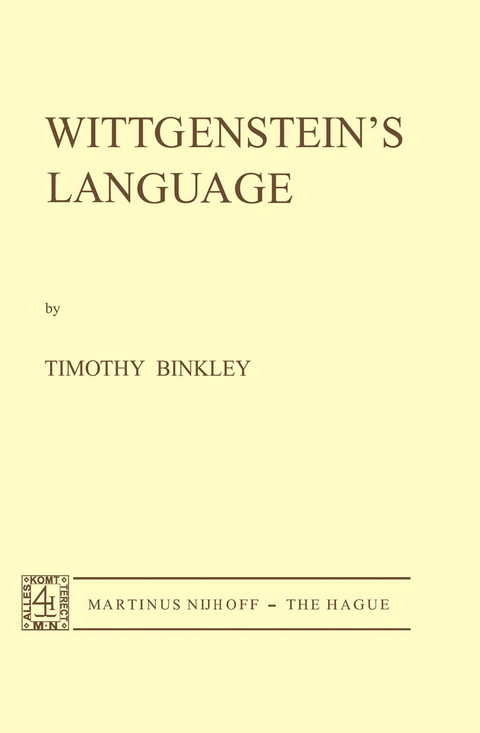
Wittgenstein’s Language
Seiten
1973
|
1973 ed.
Kluwer Academic Publishers (Verlag)
978-90-247-1541-1 (ISBN)
Kluwer Academic Publishers (Verlag)
978-90-247-1541-1 (ISBN)
One of the first things to strike the reader of Wittgenstein's writings is the unique power of his style. The unusual style is a mere curiousity decorating the vehicle of Wittgenstein's ideas. hence Wittgenstein's style is often thought to stand in the way of understanding his meaning.
One of the first things to strike the reader of Wittgenstein's writings is the unique power of his style. One immediately notices the intriguing and arrangement of the paragraphs in Philosophical Investi composition gations, or the stark assertiveness of the sentences in the Tractatus Logico Philosophicus. A sense of the singular style being employed is unavoidable, even before the reader understands anything of what is happening philos ophically. Perhaps precisely for this reason it is too often assumed that coming to understand either work has little or nothing to do with re sponding to its form. The unusual style is a mere curiousity decorating the vehicle of Wittgenstein's ideas. Form is assigned a purely incidental import, there is a coincidence of this or that rhetorical flair with the yet to be determined content of the thoughts. The remarkableness of the style is perhaps registered in a tidy obiter dictum standing beside the more arduous task of discovering the substance of the ideas being presented. our interest, or at Wittgenstein's peculiar way of writing ably captures least our attention, but it bears only minor philosophical import. Though not unprecedented as a form of philosophical composition, it does not conform to the currently acceptable conventions; hence Wittgenstein's style is often thought to stand in the way of understanding his meaning. Such assumptions can be harmless for certain types of writing; however it does not appear as though Wittgenstein's is one of these.
One of the first things to strike the reader of Wittgenstein's writings is the unique power of his style. One immediately notices the intriguing and arrangement of the paragraphs in Philosophical Investi composition gations, or the stark assertiveness of the sentences in the Tractatus Logico Philosophicus. A sense of the singular style being employed is unavoidable, even before the reader understands anything of what is happening philos ophically. Perhaps precisely for this reason it is too often assumed that coming to understand either work has little or nothing to do with re sponding to its form. The unusual style is a mere curiousity decorating the vehicle of Wittgenstein's ideas. Form is assigned a purely incidental import, there is a coincidence of this or that rhetorical flair with the yet to be determined content of the thoughts. The remarkableness of the style is perhaps registered in a tidy obiter dictum standing beside the more arduous task of discovering the substance of the ideas being presented. our interest, or at Wittgenstein's peculiar way of writing ably captures least our attention, but it bears only minor philosophical import. Though not unprecedented as a form of philosophical composition, it does not conform to the currently acceptable conventions; hence Wittgenstein's style is often thought to stand in the way of understanding his meaning. Such assumptions can be harmless for certain types of writing; however it does not appear as though Wittgenstein's is one of these.
I Prologue.- I. Philosophy and Language.- II Travelling across the Landscape.- Reminders.- II. The Landscape.- III. The Sketch.- IV. The Remark.- V. ‘You’ and ‘I’.- VI. Grammar.- VII. Natural History.- VIII. Therapy.- III Reflecting on the Album.- IX. Logic and Language.- X. Understanding Philosophical Investigations.- XI. The African Doctor.- IV Epilogue.- XII. Reflections on the Philosophy of Language.
| Erscheint lt. Verlag | 31.7.1973 |
|---|---|
| Zusatzinfo | X, 228 p. |
| Verlagsort | Dordrecht |
| Sprache | englisch |
| Maße | 155 x 235 mm |
| Themenwelt | Geisteswissenschaften ► Philosophie ► Geschichte der Philosophie |
| Geisteswissenschaften ► Philosophie ► Philosophie der Neuzeit | |
| Geisteswissenschaften ► Philosophie ► Sprachphilosophie | |
| ISBN-10 | 90-247-1541-5 / 9024715415 |
| ISBN-13 | 978-90-247-1541-1 / 9789024715411 |
| Zustand | Neuware |
| Haben Sie eine Frage zum Produkt? |
Mehr entdecken
aus dem Bereich
aus dem Bereich
die kolonialen Wurzeln der französischen Theorie
Buch | Hardcover (2024)
Matthes & Seitz Berlin (Verlag)
CHF 41,90
oder Das Leben Montaignes in einer Frage und zwanzig Antworten
Buch | Softcover (2023)
C.H.Beck (Verlag)
CHF 25,20
Auf dem Weg zu einer Kultur der Bewusstheit | Mit mehr als 500 …
Buch | Hardcover (2023)
Berlin Verlag
CHF 58,90


